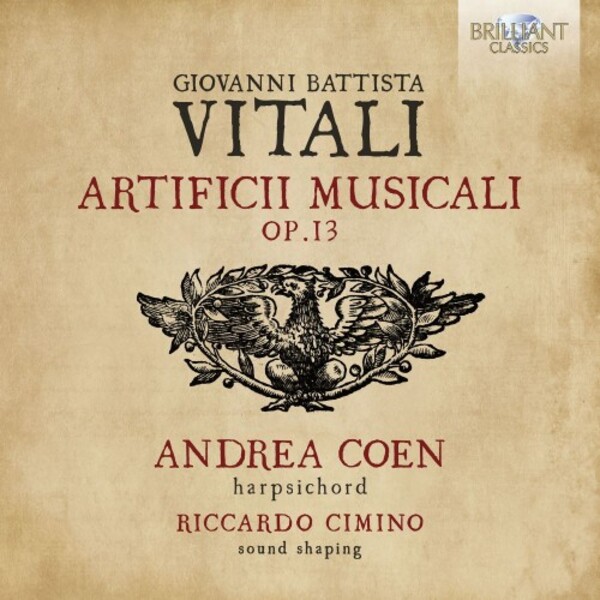
GB Vitali - Artificii Musicali, op.13
£9.45
In stock - available for despatch within 1 working day
Despatch Information
This despatch estimate is based on information from both our own stock and the UK supplier's stock.
If ordering multiple items, we will aim to send everything together so the longest despatch estimate will apply to the complete order.
If you would rather receive certain items more quickly, please place them on a separate order.
If any unexpected delays occur, we will keep you informed of progress via email and not allow other items on the order to be held up.
If you would prefer to receive everything together regardless of any delay, please let us know via email.
Pre-orders will be despatched as close as possible to the release date.
Label: Brilliant Classics
Cat No: 96686
Format: CD
Number of Discs: 1
Genre: Instrumental
Release Date: 2nd December 2022
Contents
Artists
Andrea Coen (harpsichord)About
Artificii Musicali (Modena, 1689) has given Vitali a respectable place in music history, particularly if one considers the oft supposed idea that it served as inspiration for J.S. Bach’s Musical Offering, J. Fux’s Gradus ad Parnassum (1725) and G.B. Martini’s Saggio Fondamentale Pratico di Contrappunto sopra il Canto Fermo (1774). Vitali’s Artificii Musicali appeared at a historical crossroad, during the final decades of the 17th century, when there was an explosive rise in instrumental music. The sprout of creative freedom for composers of instrumental music was immensely liberating, as the previous generations of musicians were often limited in their artistic endeavours by the rigid structures of choral polyphony or the madrigal form. Artificii Musicali is a unique pedagogical music handbook, a theoretic treatise of canonic science, and ultimately a testament to the originality and genius of its author.
There are 40 canons in this work and interspersed among them there are four that can be classified as riddle-canons or enigma-canons. These intriguing pieces are accompanied by a brief Latin motto containing the key for their realisation, which is left to the reader to decipher (of note, Bach also included two riddle-canons with Latin mottos in the Musical Offering). The final nine pieces in the Artificii are an eclectic collection of balletti, capricci, a passagallo, and two violin sonatas, representative of the main forms of instrumental music at the end of the 17th century. Although Artificii was originally written for violin and bass, Andrea Coen performs here on a harpsichord, and furthermore a harpsichord in equal temperament. Such a choice is not the result of simplification or trivialisation, but is based on confirmed historical evidence reported by Patrizio Barbieri: ‘For the entire fifty years in the middle of the 17th century, concrete attempts were made in Europe to tune harpsichords, organs and harps no longer with the usual mesotonic, but with equal temperament’.
Furthermore, the recording choices on this album were of tantamount importance, and Riccardo Cimino has shaped and spatialized the sounds with great musical sensitivity and powerful sound engineering. The finalisation of the recording in Dolby Atmos gives many possible ways of listening to the Artificii, depending on the chosen media: from the three-dimensional Atmos music audio down to a binaural stereo. This, compared to traditional stereo, presents much greater depth.
Andrea Coen is an organist, harpsichordist, and fortepianist, who has studied with such distinguished artists as Ton Koopman and Alan Curtis, and has collaborated with such figures as Christopher Hogwood and Monica Huggett. His recordings of Baroque and early-Classical keyboard repertoire for Brilliant Classics have attracted glowing reviews. Coen recorded the ‘Kleine Kammermusik’ (95683) and made the first complete recording of Telemann’s ‘100 Menuets’ (96249) and Telemann’s Fantasias (94228). According to MusicWeb International: ‘Coen, an experienced, insightful instrumentalist with a profound knowledge of historical performance practice and a sackful of important recordings under his belt, could make Telemann sound special even on a typewriter.’
Error on this page? Let us know here
Need more information on this product? Click here